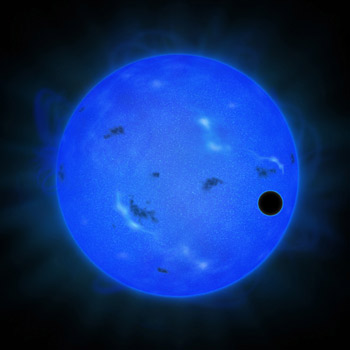Researchers Observe an Exoplanet with a Water Rich Atmosphere
As the search for Earth like and potentially habitable planets outside the solar system (exoplanets) continues, a Japanese Team of astronomers and planetary scientists has observed what seems to be a water rich atmosphere on an exoplanet.

This exoplanet is known as GJ 1214b. It is 40 light years from us and was discovered in 2009. Its mass and radius is larger than that of Earth but smaller than that of ice giants such as Neptune and Uranus making it a super earth.
The researchers made blue light observations of the light scattering of GJ 1214b’s transit around its star to determine whether its atmosphere is rich in water or hydrogen.
What they found hints that the planet has a water-rich atmosphere and their findings are consistent with findings from observations made in other colors. The researchers plan to make follow-up observations to confirm their findings.
Possibility to Observe Dark Energy Turn On
Our universe has been and is expanding. The force of gravity should be slowing down the rate of expansion but it is not. The universe is expanding much faster now. The force accelerating the expansion remains a mystery but cosmologists have considered different possibilities. The most accepted theory is a mysterious force known as dark energy.
We cannot see dark energy directly but there is a possibility that astronomers will see it turn on and learn more about its nature in the Dark Energy Survey.
A five year mission to map an eighth of the sky in incredible detail creating a time lapse movie of the past 8 billion years of a section of the universe is going on at the Cerro Tololo astronomical Observatory in Chile.
On a moonless night, it gets so incredibly dark outside this observatory that you cannot see your feet or hands. If you hold your hands up to the sky in the pitch darkness, you see a hand shaped hole with no stars in it.
Supermassive Black Holes Keep Galaxies from Expanding
The universe is expanding. Galaxies are not. Scientists have always wondered why. Something mysterious must be regulating their rate of star formation and keeping them from growing more massive or overflowing with stars.
New observations have shown one supermassive black hole’s jets blowing huge amounts of potential star forming material clear out of its galaxy. These powerful jets keeping the raw material for star formation out of galaxies may be the reason why galaxies are not getting bigger. For example, the supermassive black hole at the center of our galaxy might be preventing our galaxy from expanding.
September Night Sky: See Venus and Moon Together on Sept 8
Get your telescopes ready this Sunday evening (Sept 8) to watch Venus and the Moon together in the sky. The crescent moon will pass near the dazzling planet Venus.
The best time to view this event is just before and after sunset. If you live in Argentina or Chile, you are especially lucky as you will have an opportunity to witness the spectacular event known as an occultation where the moon will actually pass in front of Venus.
